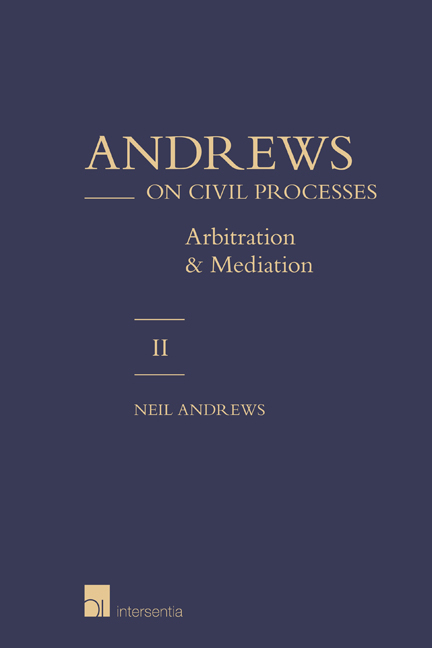Book contents
- Frontmatter
- Dedication
- CONTENTS VOLUME I
- Contents
- Table of Cases
- Table of Statutes
- Table of Statutory Instruments
- PART I MEDIATION
- PART II ARBITRATION
- Chapter 3 Commercial Arbitration: What Is It and Why Choose It?
- Chapter 4 The Major Principles of Arbitration and Litigation: A Comparison
- Chapter 5 Fundamental Features of English Arbitration
- Chapter 6 ‘The Seat’ and the Range of Relevant Laws
- Chapter 7 ‘Arbitrability’: Public Policy Limitations upon the Scope of Arbitration
- Chapter 8 A Confidential Process
- Chapter 9 Arbitration Agreements
- Chapter 10 Courts Giving Effect to Arbitration Agreements
- Chapter 11 Commencement of the Submission and Time Issues
- Chapter 12 The Tribunal's Appointment, Tenure and Immunity
- Chapter 13 Pre-Hearing Proceedings
- Chapter 14 The Hearing
- Chapter 15 Final Remedies, the Award, and Correction of the Award by the Tribunal
- Chapter 16 Fees, Expenses and Recoverable Costs
- Chapter 17 Arbitration Awards: Issues of Finality and Res Judicata
- Chapter 18 Challenges to English Arbitral Awards under English Law
- Chapter 19 English Enforcement of English Awards
- Chapter 20 Enforcement under the New York Convention (1958)
- PART III CONSUMER ADR
- Select Bibliography
- Index to Volumes I and II
Chapter 16 - Fees, Expenses and Recoverable Costs
from PART II - ARBITRATION
Published online by Cambridge University Press: 13 December 2017
- Frontmatter
- Dedication
- CONTENTS VOLUME I
- Contents
- Table of Cases
- Table of Statutes
- Table of Statutory Instruments
- PART I MEDIATION
- PART II ARBITRATION
- Chapter 3 Commercial Arbitration: What Is It and Why Choose It?
- Chapter 4 The Major Principles of Arbitration and Litigation: A Comparison
- Chapter 5 Fundamental Features of English Arbitration
- Chapter 6 ‘The Seat’ and the Range of Relevant Laws
- Chapter 7 ‘Arbitrability’: Public Policy Limitations upon the Scope of Arbitration
- Chapter 8 A Confidential Process
- Chapter 9 Arbitration Agreements
- Chapter 10 Courts Giving Effect to Arbitration Agreements
- Chapter 11 Commencement of the Submission and Time Issues
- Chapter 12 The Tribunal's Appointment, Tenure and Immunity
- Chapter 13 Pre-Hearing Proceedings
- Chapter 14 The Hearing
- Chapter 15 Final Remedies, the Award, and Correction of the Award by the Tribunal
- Chapter 16 Fees, Expenses and Recoverable Costs
- Chapter 17 Arbitration Awards: Issues of Finality and Res Judicata
- Chapter 18 Challenges to English Arbitral Awards under English Law
- Chapter 19 English Enforcement of English Awards
- Chapter 20 Enforcement under the New York Convention (1958)
- PART III CONSUMER ADR
- Select Bibliography
- Index to Volumes I and II
Summary
INTRODUCTION
Those technically qualified to graduate (or to receive postgraduate degrees), and now proposing to gain their degree, are unable to receive their degrees in the University of Cambridge unless they have paid their university and college bills. A Rite of Passage is thus subject to a prior Right to Payment. On a similar basis, the arbitral tribunal can withhold the award if they have not yet been paid in full for their fees and expenses.
Here there are two matters, (i) the question whether the arbitrator (or tribunal) is entitled to fees and expenses, or entitled to keep payments made in respect of these and (ii) the question of payment of costs as between the parties to the reference. These will be examined in turn.
ARBITRAL TRIBUNAL's FEES
The court can determine a dispute over fees and expenses. It would not seem to matter whether the fees have yet to be paid or whether they have already been paid, because the criterion to determine whether they are ‘excessive’ should apply uniformly. This appears to be the judicial approach, even though the criteria are only set out in connection with the second context.
In a case where the fees had been paid in order to obtain the award (this is the usual case), in Hussmann (Europe) Ltd v. Al Ameen Development & Trade Co (2000), Thomas J examined closely the fees submitted by a tribunal and held that they were not excessive, although the number of hours spent was surprisingly high and the fee claim was, therefore, borderline. It might be significant that the chairman in this case was a judge who had been permitted to act gratuitously, although his ‘fee’ would be paid to the Treasury. There was certainly no suggestion that the hours claimed had not genuinely been worked.
In United Tyre Co Ltd v. Born (2004) the Court of Appeal considered a preliminary issue concerning delay in the bringing of an application under section 28(3) for adjustment of a fee. Again in this case (as is usual) the fee had already been paid in order to obtain the award. The fee greatly exceeded the value of the claim and the number of hours claimed, in addition to secretarial hours, was surprisingly high.
- Type
- Chapter
- Information
- Andrews on Civil ProcessesArbitration and Mediation, pp. 313 - 318Publisher: IntersentiaPrint publication year: 2013



